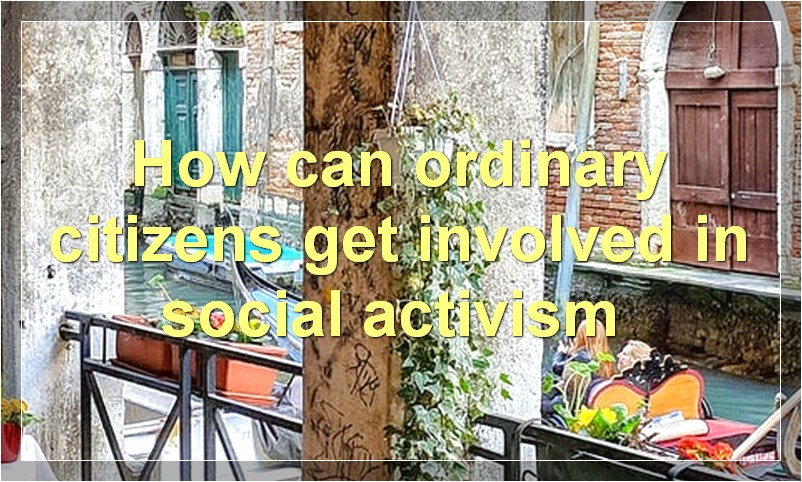The world is full of social challenges, from poverty and inequality to climate change. But people have always fought back against these problems, using their voices and their actions to demand change. This is what social activism is all about.
And while social activism can take many different forms, it all has the same goal: to make the world a better place. Whether it’s protesting for better working conditions or campaigning for stricter environmental laws, social activism can help to fight social challenges in a number of ways.
So if you’re looking for a way to make a difference, consider getting involved in social activism. It’s one of the most powerful tools we have for fighting social challenges.
What is social activism?
There is no one answer to this question as it can mean different things to different people, but in general, social activism refers to efforts to bring about social change. This can take many forms, from working to raise awareness about a particular issue to directly advocating for policy changes. Whatever the approach, social activists typically seek to promote positive social change by raising voices and working collaboratively towards common goals.
While social activism can take many different forms, there are some common elements that often characterize these efforts. For one, social activists typically seek to promote change at both the individual and societal level. They may work to raise awareness about a particular issue and encourage others to take action, but they also often advocate for systemic changes that can address the root causes of problems.
In addition, social activism is often driven by a shared sense of justice and equality. Those involved in these efforts typically believe that everyone deserves the same rights and opportunities, regardless of their background or circumstances. This belief often fuels their passion for promoting change and drives them to stand up against discrimination and unfairness.
Of course, not everyone who seeks to bring about social change is considered a social activist. The term is typically used to describe those who dedicate a significant amount of time and energy to these efforts, often at personal risk. However, anyone can take part in social activism in some way, whether it’s speaking out against an injustice or simply lending a helping hand to those in need.
So what is social activism? It’s difficult to provide a single definition, but in general, it refers to efforts to bring about positive social change. Those involved in these efforts typically seek to improve conditions at both the individual and societal level, and they are driven by a shared sense of justice and equality. While not everyone who seeks to change the world is considered a social activist, anyone can take part in these efforts in some way.
What are some common social issues that social activists fight for?

When it comes to social issues, there are a lot of different things that social activists might fight for. It really depends on what the particular activist is passionate about and what they feel needs to be changed in society. Some common social issues that social activists might fight for include things like equal rights, education reform, healthcare reform, and environmental protection. Basically, if there is something that an activist feels is unjust or needs to be improved in society, they will likely try to fight for change.
Why is social activism important?
In a world that is increasingly driven by self-interest, social activism provides a much-needed counterbalance. By its very nature, social activism is about taking action to improve the lives of others and make the world a better place. It’s about standing up for what’s right, even when it’s not popular or easy.
And it’s needed now more than ever. With so many challenges facing our world today – from poverty and inequality to climate change and human rights abuses – we need people who are willing to take a stand and fight for what they believe in.
Of course, social activism is not without its risks. In many parts of the world, activists are persecuted, jailed or even killed for their work. But despite the risks, they continue to speak out and fight for change.
So why is social activism important? Because it gives voice to the voiceless, because it stands up for the powerless, and because it makes us better people. We all have a responsibility to make the world a better place, and social activism is one of the most powerful tools we have to make that happen.
How can social activism help to make positive changes in society?
There is no single answer to the question of how social activism can help to make positive changes in society. It depends on the specific goals and methods of the activists, as well as the social and political context in which they are working. However, there are some general ways in which social activism can bring about positive change.
First, social activism can raise awareness of important issues and mobilize people to take action. This is perhaps the most important role of social activism, as it is only through public pressure that governments and other powerful institutions are likely to change their policies or practices.
Second, social activism can help to build support for specific reforms or changes. This can be done through protests, marches, and other forms of visible advocacy, as well as through more informal education and organizing work.
Third, social activism can directly challenge unjust policies or practices. This may involve civil disobedience or other forms of direct action, which can be effective in bringing about short-term changes.
Fourth, social activism can provide essential support to those who are directly affected by injustice. This includes providing material assistance, emotional support, and legal help.
Finally, social activism can promote long-term systemic change. This may involve working to change laws or regulations, or to shift public attitudes on a particular issue. It can also involve supporting progressive candidates for office or working to build independent political power.
What are some examples of successful social activist campaigns?
There are many examples of successful social activist campaigns throughout history. Some notable examples include the American Civil Rights Movement, the Indian Independence Movement, and the Suffragette Movement. Each of these campaigns was successful in bringing about change in their respective societies.
The American Civil Rights Movement was a mass protest movement that fought for equal rights for African Americans in the United States. The movement began in the late 1950s and continued into the 1960s. During this time, many activists, including Martin Luther King Jr., were jailed or assassinated. Despite the challenges, the Civil Rights Movement was successful in ending segregation and gaining equal rights for African Americans.
The Indian Independence Movement was a long-running campaign that eventually resulted in the independence of India from British rule. The movement was led by Mahatma Gandhi and included protests, civil disobedience, and hunger strikes. After years of struggle, India was finally granted independence in 1947.
The Suffragette Movement was a campaign for women’s right to vote in the United Kingdom. The movement began in the early 1900s and lasted for several decades. Suffragettes faced opposition from the government and violence from anti-suffragettes. In 1918, the Representation of the People Act was passed, which gave women over the age of 30 the right to vote. This was a major victory for the Suffragette Movement and helped pave the way for gender equality in the UK.
These are just a few examples of successful social activist campaigns. Throughout history, there have been many other campaigns that have brought about positive change in society.
How can ordinary citizens get involved in social activism?

In a world that seems increasingly divided, it’s more important than ever to get involved in social activism and stand up for the causes you believe in. But if you’re not a professional activist or organizer, it can be hard to know where to start. Here are some ideas for how ordinary citizens can get involved in social activism and make a difference.
1. Show up. One of the most important things you can do as an ally is to show up – whether that means attending a protest or rally, or simply being present and available to listen and learn. Showing up demonstrates your solidarity with the cause, and can also be a way of providing support for those who are on the front lines.
2. Educate yourself and others. Another crucial way to support social justice movements is to educate yourself and others about the issues at hand. This means learning about the history and context of the issue, understanding the arguments of both sides, and staying up-to-date on current events. It also means being willing to have difficult conversations with friends and family members who may not share your views.
3. Amplify marginalized voices. One way to ensure that all voices are heard is to amplify the voices of those who are most often marginalized. This includes using your platform (if you have one) to amplify the voices of activists, sharing their stories and perspectives, and using your privilege to help them be heard.
4. Donate time or money. Many social justice organizations rely on volunteers and donations to keep their work going. If you’re able, consider donating your time or money to support their efforts. This can be a great way to directly impact the work of organizations you believe in, and to help them continue their important work.
5. Stay engaged. Finally, one of the most important things you can do is stay engaged – even when it’s difficult, or when progress seems slow. Social change takes time, and it’s important to stay committed to the causes you care about in order to see real change happen.
What role do social media and technology play in social activism?
Social media has become a powerful tool for social activists. It allows them to reach out to a larger audience and share their message with the world. It also allows activists to organizing and coordinating their efforts.
Technology has also played a role in social activism. It has allowed activists to create websites and online petitions. It has also allowed them to connect with each other and share information quickly and easily.
What are some challenges that social activists face?
As the world progresses, society becomes more complex and interconnected. The problems that social activists face become more difficult to solve. Here are some of the challenges that social activists face:
1. Increasingly Complex Problems: Social activists are often trying to solve problems that are becoming more and more complex. For example, climate change is a problem that is caused by a multitude of factors, including human activity. As the world becomes more industrialized and populated, the problem of climate change becomes more difficult to solve.
2. Limited Resources: Social activists often have limited resources with which to work. They may be working on a shoestring budget or relying on volunteers. This can make it difficult to effectively solve problems.
3. Opposition: Social activists may face opposition from those who do not agree with their goals or methods. This opposition can take many forms, from verbal arguments to violence. It can make it difficult for social activists to get their message across or to make progress on their goals.
4. Burnout: Social activism can be emotionally and mentally draining. Activists may feel like they are fighting an uphill battle with little chance of success. This can lead to burnout, which can make it difficult for activists to continue their work.
How can we support social activists and their causes?
The world is full of social activists. They’re the people who campaign for a fairer, more just society; who stand up for the voiceless and the vulnerable; who fight for change. And they need our support.
So how can we best support social activists and their causes? Here are some suggestions.
1. Be an active ally
If you believe in social justice, don’t just sit on the sidelines – get involved. There are lots of ways to support social activists and their work, even if you can’t be out on the frontlines yourself. Research the issues they’re campaigning on, sign petitions, write to your local representatives, donate to relevant organisations… There are endless ways to take action. Find the ones that work best for you and get stuck in.
2. Use your voice
Another way to support social activists is to use your voice – literally. Speak out against injustice when you see it happening; call out racism, sexism, homophobia, transphobia, ableism, xenophobia… Don’t let hate go unchallenged. Show solidarity with marginalised groups and amplify their voices whenever you can.
3. Educate yourself and others
Social activists are often fighting against systemic oppression – which means that education is key. Learn about the issues they care about, share what you’ve learned with others, and challenge harmful myths and stereotypes whenever you encounter them. The more informed we all are about social justice issues, the stronger our movement will be.
4. Show your appreciation
Social activism can be tough going – it’s emotionally and mentally demanding work. So make sure to show your appreciation for the activists in your life. Let them know that you see and value their efforts; that you’re grateful for everything they do; that you stand with them in solidarity. A little bit of thanks can go a long way.
5. Take care of yourself (and each other)
Self-care is important for everyone – but it’s especially crucial for social activists, who often put themselves under immense pressure. Make sure to prioritise your own wellbeing, and reach out to your friends and loved ones if you ever need emotional support. We’re all in this together, so let’s take care of each other as best we can.
What kind of impact can social activism have on society as a whole?
When it comes to social activism, the impact that it can have on society as a whole is both significant and far-reaching. For starters, social activism can help to raise awareness about important issues that may otherwise go unnoticed. Additionally, social activism can also help to bring about much needed change on a local, national, and even global scale.
Of course, social activism is not without its challenges. For example, it can be difficult to get people to care about certain issues, and even more difficult to get them to take action. Additionally, there is always the risk that social activism will be met with resistance or even violence. However, despite these challenges, social activism remains an important force for good in the world.
So, what kind of impact can social activism have on society as a whole? The answer is: a very positive one.




